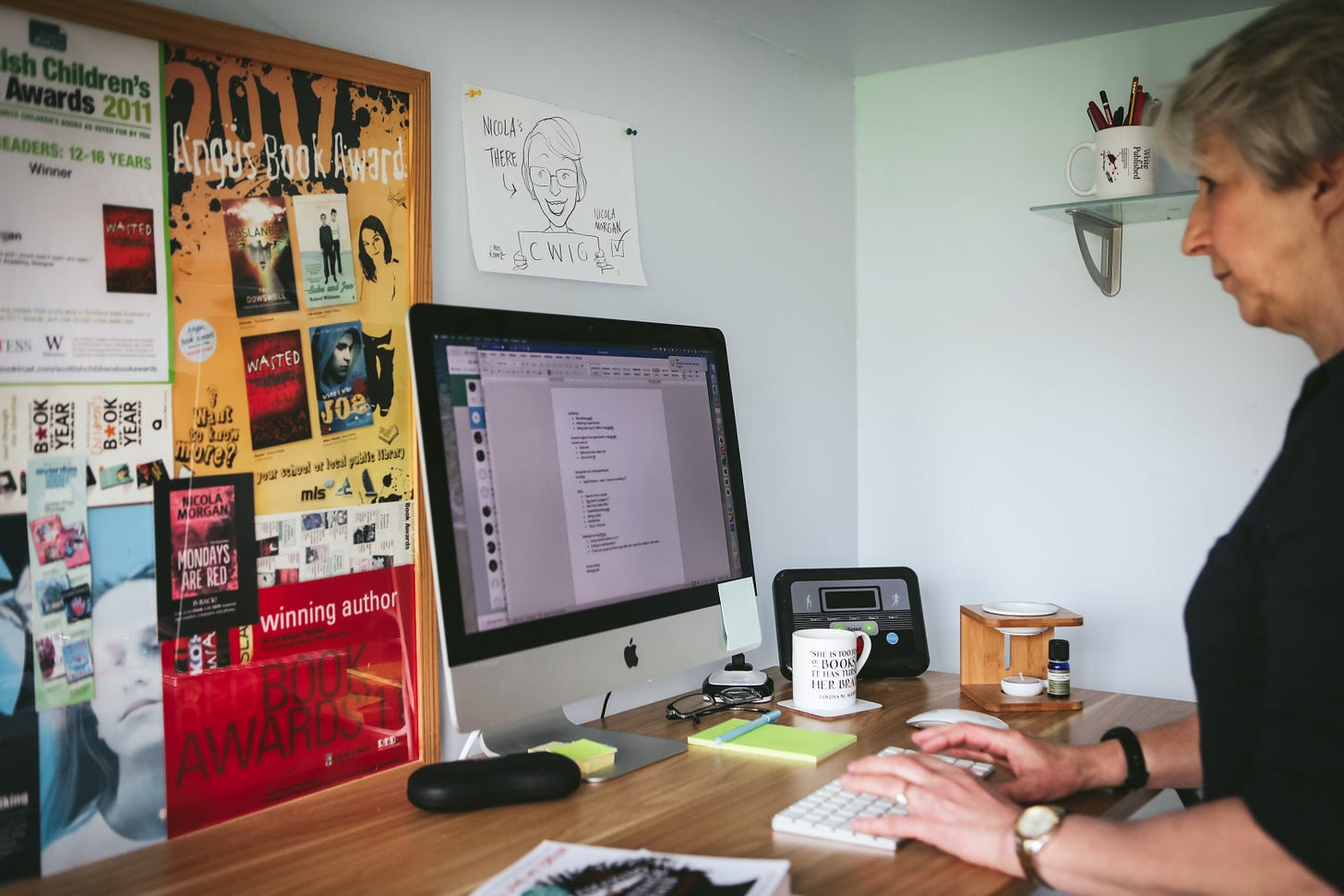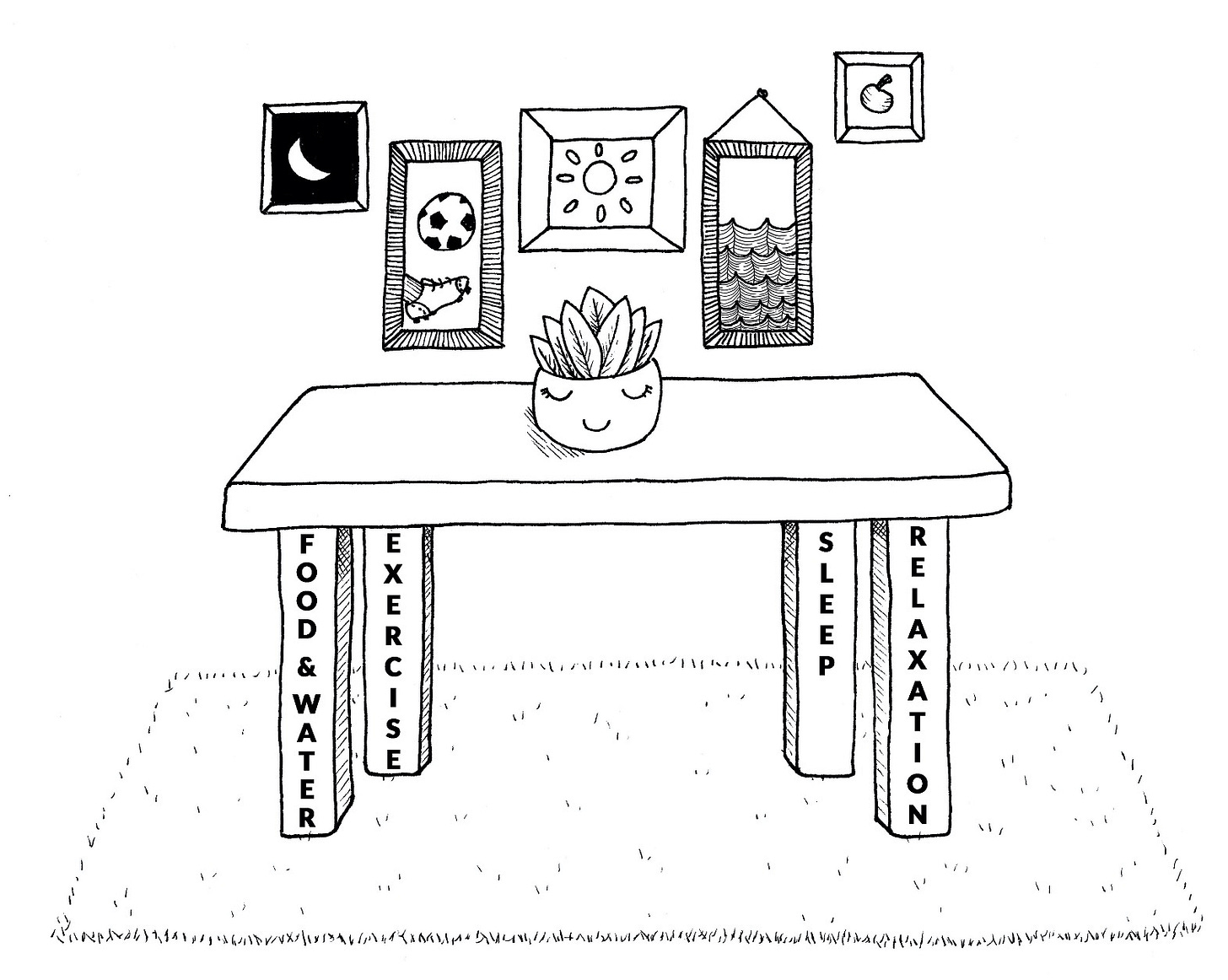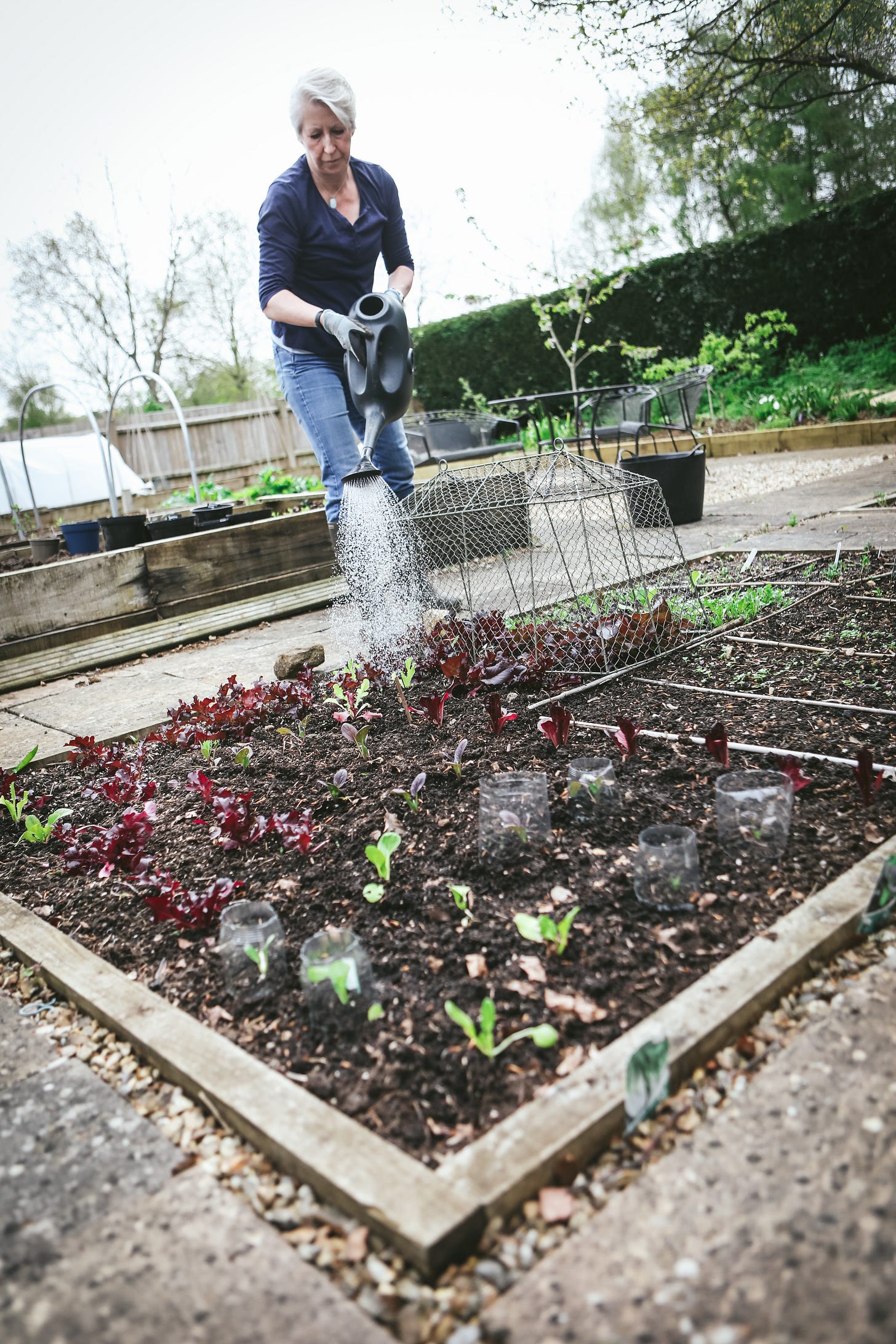Do you recognise these thoughts, either in yourself or someone you know?
Exercise? I don’t have time just now.
Healthy eating? I’ll do it after I get through this busy week/month.
Dinner tonight? It’ll have to be a takeaway. No time to cook…
Lunch? Sandwich at my desk. No time to go out.
Fitness app tells me to get up and move once an hour - let me just finish this task.
Sit down for a few minutes?! Lucky you if you can do that - I certainly can’t.
Reading is for holidays and holidays come after the work is done.
No, sorry - too much work on.
I can manage with less sleep just for a few weeks.
I’m too busy for …
Yes, me too. We all do it. Some people do it more than others. Some people have more to do, certainly. Some people have exams/children/responsibilities/pressure. Busy people often take on too much. That old cliché, “if you want something done, ask a busy person”, is true because a busy person is usually a high-achieving, dynamic, energetic, organised and all-round brilliant person who thrives - they think - on being busy.
But this way burnout lies.
Burnout is not attractive. It’s not something to be proud of. Trust me - I’ve done it. As in I’ve actually felt proud to be burnt out. Many years ago and more than once. I’m deeply unproud of this but I’ve been proud when a doctor has told me to take time off. Proud that I couldn’t actually take time off because when you’re self-employed your boss doesn’t give you time off. For a high-achieving person it can be a badge of honour to be TOO busy. (It’s also incredibly annoying for other people.)
As someone who has regularly had “too much to do” I can tell you that you do not have so much to do that you can’t take the few minutes required to do the very simple things that will look after you and stop burnout.
In fact, it is your duty, as the owner of your body/brain/life, to look after it.
Remember: if you want something done you ask a busy person. That is because the truly successful busy person fits another thing in by being clever and strategic. Success comes through being those two things, not by magic and not by being given the gift of extra time.
Talking of busy people: I have a webinar coming up and there are still some spaces. Are you a parent, relative, teacher, anyone who wants to understand teenagers more deeply so you can support them better? Check out Understanding and Supporting Your Teenagers and make a booking before you forget!
Anyway…
… let me show you how to find 15 minutes
This is all you need and you can find it. Honestly, you can! It’s not that I’m saying you have a spare 15 minutes; it’s that you can carve 15 minutes out of your day by being clever and creative. (I’ll show you how.)
The beauty is that when you do this, you will give yourself extra power to complete everything else. You will get the other stuff done faster and better because this 15 minutes is going to improve your brain, your energy and your health.
I call this a magic 15 minutes because it goes against the laws of maths. You’d think that by taking 15 minutes to do something you’d have 15 fewer minutes for everything else. But actually the opposite happens: this 15 minutes actually allows you to do MORE. You see, the amount of time you spend on tasks is not what allows you to succeed at them. What allows you to succeed at tasks is how well you work at them, not how long you work for.
This 15 minutes makes you better able to work better. So you don’t need to work for so long.
It really is a magic 15 minutes. In fact, once you’ve realised how it works you’ll find you can find 20…
What to do in the magic 15 minutes
Note 1: When I suggest something that won’t work for you, don’t roll your eyes and refuse to read on. Just ignore it and focus on what you could do.
Note 2: you can either do this in one 15 minute block or split it up. Some of the ideas would take 15 minutes but most could take fewer. Some you can do while working so they don’t cost any time at all. Win!
When I’m teaching wellbeing and mental/physical health and strength, I use the image of the four-legged table. You need to look after all the legs otherwise you can’t have good strength.
Relaxation
Control your breathing. I can’t overemphasise the power of this. You can (should) do this many times a day, actively and consciously lowering, slowing and deepening your breathing, relaxing your stomach muscles. It slows your heart rate and reduces tension in your muscles. It will help you work, concentrate and be well. It gives you better heart rate variability. By NOT doing it, you strain your vascular system and eventually make yourself much less fit and healthy.
Spend a few minutes practising mindfulness. Focus on something - your body, the air, your drink of water, the sounds you can hear, the leaves on a tree, the veins in a leaf, the smell of hand cream - anything simple and here.
Body scan: sit comfortably and focus on tensing and then relaxing each group of muscles in turn, starting with your feet and spending extra focus on your neck and the muscles in your face and jaw.
Take five minutes to give yourself a hand massage with some hand cream or even olive oil.
Do some face yoga. Internet search!
Exercise
People think they don’t have time for exercise because it takes too long when you’re busy. But it’s incredibly important to make time. Just 15 minutes will make a massive difference but 20 will be better. And honestly, if you can find 15, you can find 20… Besides, remember my point that finding this time actually makes you get more work done so it’s actually FREE.
Get some fresh air and a brisk walk that raises your heart rate. Raising your heart rate with exercise = good; raising your heart rate with stress = not good.
Do a set of stretches, holding each pose hard for 30 seconds. You could spend just two minutes doing this twice a day and that would be just 4 minutes spent. If you’ve got lots of things to think about or plan, you can keep thinking/planning, so you’ve spent no time at all!
Fast running on the spot or skipping for a minute. That’s ONE minute!
If you’re collecting children from school or nursery, schedule leaving home/office a few minutes earlier and extending your journey with a brisk walk. (You’ve got to schedule it otherwise you won’t do it. I know you…)
Get off the bus a few stops earlier and walk the rest.
Walk up and down a flight of stairs. Then do it again.
Is there a physical job you need to do? Do it! I have a large garden and that takes more time than I really have but I can nip out of my office and go and water/weed/pick/pot for a few minutes and I benefit from a) the activity b) the break and c) getting a job done!
Go for a short run and, if you want to, plan your project/ day/ revision/ presentation/ email while you’re doing it. I realise that going for a run also involves getting changed so takes a bit of extra time but see the run as working time if that helps you get it done. I do loads of work in my head while I’m running!
Extra point: NOTICE how much better you feel when you do these things and NOTICE how consequently you get more work done. result: it’s actually cost you no time.
Food and drink - nutrition
When we are too tired or busy we tend to reach for the least healthy foods, choosing quick sugar, snacks and highly processed foods over wholefoods and more brain-fuelling options. But if you want your brain and body to work better, you need to take a tiny bit more time to make good choices.
When you’re preparing a meal, take a couple of extra minutes to prepare a fruit salad or cut up some carrots and cucumber and whizz up some tasty homemade hummus out of spare vegetables. (Try the fantastic ideas from @Chicpfood on instagram.) If you have snacks like this easily available when you want them, you’re far more likely to choose them rather than a bag of crisps or a sugary biscuit.
Don’t buy the foods you don’t want to be tempted by!
Take five minutes from your desk to drink - and enjoy - a delicious glass of water with ice or fruit or a slice of cucumber if you like. Notice it freshening your mouth and visualise it flowing through your body.
Break your work for a few minutes to eat a well-chosen snack. Oatcakes with cream cheese or peanut butter; a cheese and salad sandwich; handful of nuts and seeds; an apple or banana.
Batch cook a supply of oat/seed/granola bars at the weekend so you have a supply for the week. Yes, it takes longer than 15 minutes to make them but this is for the whole week, remember.
Here is my own recipe for what I call Brain Bars. You can adapt it to suit your tastes, omitting and replacing any of the fruits, nuts and seeds.
There are other recipes online. Note that some recipes have far more sugar and butter than you need so choose ones that have less (or just reduce it.) If there’s fruit in it you get all the sweetness you need from that so adding a banana and reducing the other sugar is usually a good plan.
Make a good choice at breakfast and you’ll be less tempted by sugar during the morning. For example, a bowl of porridge or an egg or two will fuel your brain beautifully. Avoid sugary and highly processed cereals or pastries. Also note that most bought cereal bars are drenched in sugar and contain ill-advised ingredients.
DO leave your desk at lunchtime. Just reaching for your food and staying where you’ve been all morning is not looking after yourself.
In a rush at breakfast? It’s OK to eat your breakfast standing up but in that case how about simultaneously making a packed lunch so that you can go and eat it in a nearby park and avoid the cost of going to a sandwich shop. Your homemade sandwich is also most likely to be better for you - and will have all the tastes you want in it.
Make a big batch of homemade soup and take a portion into work each day. If you have a soup-maker this is super quick but you don’t need one.
Do the same with smoothies.
Take a few moments to check out the ingredients of foods that you buy. I would strongly recommend avoiding or minimising “ultra processed food” or UPF, defined as food that contains ingredients that you would not find in a domestic kitchen. (For all the reasons why, read Chris van Tulleken’s Ultra-Processed People. If you dare…) The theory is that UPF mess with appetite, desire, and how our bodies respond to what we put in them, to the detriment of health, weight and energy.
Cooking from scratch does not have to take much time. In 15 minutes you could throw together a stir-fry with veg and strips of chicken; home-made pasta with olive oil, tuna, tomatoes and grated cheese; a baked potato (started in the microwave) with baked beans and a salad; a piece of salmon with couscous and broccoli, flavoured with olive oil and lemon juice; spaghetti with bolognese from the freezer; scrambled eggs on toast with a salad and a fruit salad with yogurt for dessert. The list could go on! And, with most meals, if you make double quantities every time you have a whole extra meal at no extra time cost.
Have a cup of tea and a biscuit - but actually stop what you’re doing and go and drink it somewhere peaceful. Do your breathing exercises at the same time.
Eat your snack “mindfully”, properly stopping what you’re doing.
Sleep
Sleep is important for every aspect of your health and how well your brain works for you. It is definitely worth prioritising, but that doesn’t necessarily mean getting as much as possible. Many people could actually have less sleep as long as it’s good enough quality. Decide what’s right for you, based on how you feel during the day, and aim to have about the same amount each night.
Have a nap if you want to and if you can. Fifteen minutes is a great length - much longer and you’d sleep too deeply. Don’t nap in the evening, though, as this will harm your important night-time sleep.
Get daylight, especially during the morning. Focus on how you can get as much outside time during the morning. Walk to work/school or walk for ten minutes before you settle down to work. Open your curtains as soon as you wake up.
Close your curtains/blinds a good two hours before bed. And switch bright lights off.
Routines help sleep. So, as much as you can, have meals, exercise, relaxation etc at the same times of day. Go to bed and wake up at the same times when possible.
Exercise during the day helps sleep at night. Ideally, have your exercise in the morning or early afternoon.
Don’t work too late at night. You need at least one and ideally two hours of winding down before bedtime.
Switch off all screens and electronic devices two hours before bed. (Only exception is an ebook reader as long as not connected to the internet.)
You’ll find loads of advice about sleep here and don’t forget my book, The Awesome Power of Sleep.
What now?
Now you have to work out which of those things you can do. If you doubt you can do it - spoiler alert: you can! - I’d suggest picking one from each of the four “legs” and start with that.
I also suggest writing down your plans and maybe discussing with your family so they know what your aims are.
If you’re wanting to help a young person make good choices, discuss with them what they could do.
Then start! Now, not tomorrow!
Finally, importantly, check in each day and notice:
What went well - what you did that felt right.
What went wrong - why and how could you fix it. (Don’t beat yourself up.)
How did it make you feel better. Note how you still achieved everything you would have achieved - and very likely more.
It is your body, your brain, your life. You don’t get another one. And if you really do want to achieve the very best you can, you have to look after your body, your brain, your life. Now, not next week or next year.
And the best thing is: you’ll feel better, too. Because the whole point is that when we feel better - in our body, our brain, our life - we work better, function better, do better.
It really is a win, win. And I just wish I’d recognised this many years ago.
IMPORTANT: Don’t forget to book your place on Understanding and Supporting Your Teenagers. I’m afraid all the Earlybird tickets are sold but there are still some other spaces and it’s still terrific value! It will probably also be the last one I do… Can’t make April 30th? Book your space and you’ll get the recording afterwards. Hurry! There’s a limit on spaces! Please tell your friends and your children’s/teenagers’ schools.







